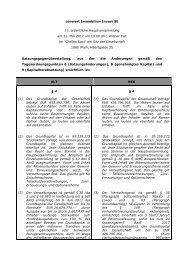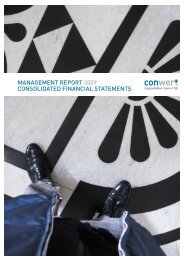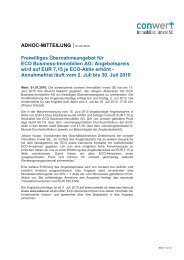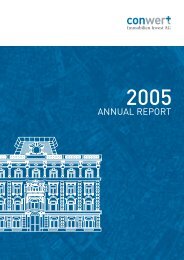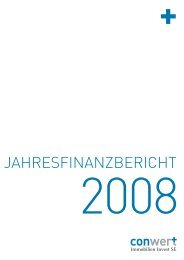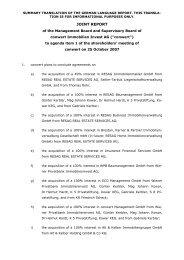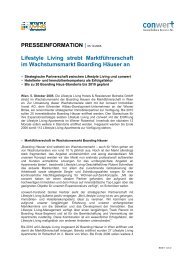annual financial statement 2011 - conwert Immobilien Invest SE
annual financial statement 2011 - conwert Immobilien Invest SE
annual financial statement 2011 - conwert Immobilien Invest SE
Create successful ePaper yourself
Turn your PDF publications into a flip-book with our unique Google optimized e-Paper software.
INTRO |<br />
| CONSOLIDATED FINANCIAL STATEMENTS | FINANCIAL STATEMENTS<br />
MANAGEMENT REPORT<br />
Risk management report<br />
OUTLOOK<br />
OVERALL ECONOMY IN THE EURO AREA INCLUDING GERMANY<br />
The overall economic situation in the euro area is still tense and early economic indicators suggest<br />
a mild recession. In its forecast for the year 2012 from February of the current year, the EU<br />
Commission expects GDP to decline by 0.3% in the euro area. The Commission thus predicts a<br />
stagnation in economic growth for the year 2012, but sees indications that the European economy<br />
will stabilise. Inflation is expected to amount to 2.3% in the European Union (EU27) in the current<br />
year. Moreover, the Monetary Council of the European Central Bank again decided to maintain the<br />
base rate at 1% at its regular meetings on 9 February and on 8 March 2012. However, several experts<br />
assume that, with determined actions, a turnaround is possible in the course of the year 2012<br />
and the European Union will be able to achieve growth and increasing employment figures through<br />
the stabilisation. The agreement to a further development of the crisis instruments throughout the<br />
EU and the <strong>financial</strong> pact for fiscal policy coordination in the euro zone creates new framework<br />
conditions, which are designed to contribute to decreasing the existing uncertainty in the economy.<br />
However, <strong>financial</strong> experts believe that – aside from temporary phases of recovery – negative influences<br />
will be the prevailing element until spring 2012, which indicates further declines in share<br />
prices. Only with a new start in the euro periphery and first signs of economic stabilisation, the<br />
development should level out and could introduce a turnaround in the second half of the year 2012.<br />
(EU Commission, Interim Forecast February 2012, Peter Brezinschek, Raiffeisen Research, Q4/<strong>2011</strong>)<br />
According to a forecast by the German Institute for Economic Research (DIW) in Berlin on the<br />
development of the real gross domestic product in Germany in the year 2012, GDP growth is<br />
expected to amount to 0.6% compared with the previous year. In contrast, a 2.2% change in GDP is<br />
forecasted for the year 2013.<br />
(DIW Berlin; Federal Statistical Office)<br />
AUSTRIA<br />
Although from today’s perspective it is not yet certain whether the measures taken so far by the EU<br />
and the ECB will suffice, many <strong>financial</strong> experts assume that the euro area has the means to end<br />
the crisis. Therefore, they still do not expect another recession of the Austrian economy. However,<br />
the confidence crisis is likely to leave massive traces on the real economy in Austria in the year<br />
2012. The EU Commission therefore only expects an increase by 0.7% in the Austrian GDP. Moreover,<br />
it assumes that demand by the public sector will decline also in Austria in 2012, which may<br />
lead to a reduction of investment activities. The Commission predicts an inflation rate of approx.<br />
2.4% in Austria in the year 2012. Despite overcoming the confidence crisis, growth prospects will<br />
remain subdued as the reins will be tightened significantly in terms of fiscal policy, but thanks to a<br />
more robust global upswing, a higher increase in GDP should be possible again in 2013.<br />
(Unicredit Research, 15 December <strong>2011</strong>; EU Commission, Interim Forecast February 2012)<br />
Wiener Börse AG also expects a volatile year on the stock exchange in 2012. Should the market<br />
climate take an unexpected turn and develop positively, the management of the stock exchange<br />
expect stocks to return to pre-crisis levels and new initial public offerings. In early 2012, a trend<br />
towards short IPO windows was visible. Several candidates for the stock exchange are in the<br />
waiting loop. International investors continue to be very important for the domestic capital market.<br />
As in the past, major investors will come from the USA and Great Britain in the year 2012.<br />
(Vienna Stock Exchange, 30 December <strong>2011</strong>, Statement of the Management Board Vienna Stock Exchange)<br />
PROPERTY MARKETS<br />
RESIDENTIAL PROPERTIES VIENNA<br />
The residential property boom in Vienna will continue in 2012 despite, or rather because of, the<br />
weak economic prospects, according to experts. Freehold flats are considered an ideal investment<br />
in the debt crisis. In <strong>2011</strong>, freehold flats recorded price increases between 7% and 9% in individual<br />
submarkets. Especially in the sixth, seventh and ninth districts, prices per square meter exceeded<br />
5,000 €. The fifth and the adjacent twelfth district, previously less popular, are expected to outperform<br />
the market average in 2012, according to experts’ forecasts. This upward trend will not<br />
prevail in terms of rental prices. Competition from municipal and non-profit housing with legally<br />
defined upper limits for rents and the strong demand for freehold flats should dampen an upward<br />
development for rents. The increase will roughly correspond to the inflation rate in the experts’<br />
opinion.<br />
(EHL, Report on investment properties 2012)<br />
35



